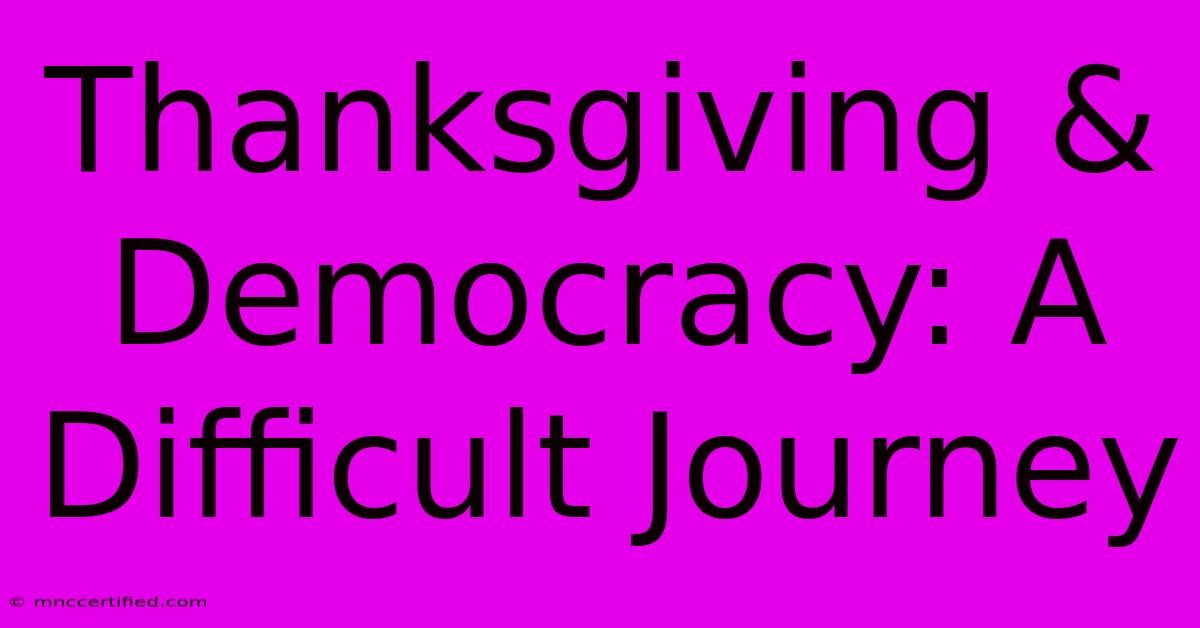Thanksgiving & Democracy: A Difficult Journey

Table of Contents
Thanksgiving & Democracy: A Difficult Journey
Thanksgiving, a holiday celebrated annually in the United States and Canada, is often portrayed as a heartwarming story of peace and abundance. However, a deeper examination reveals a complex and often troubling relationship between this national holiday and the realities of American democracy, a relationship marked by both progress and profound contradictions. This exploration delves into the uncomfortable truths underlying the festive narrative, highlighting the long and difficult journey towards a more inclusive and equitable society.
The Myth of a Peaceful Harvest
The idyllic image of the first Thanksgiving, with pilgrims and Native Americans sharing a bountiful harvest, is largely a myth. The reality was far more brutal. The arrival of European colonists marked the beginning of a period of displacement, disease, and violence against Indigenous populations. The "harvest" celebrated was built upon the dispossession and suffering of native peoples, whose lands and way of life were systematically destroyed. Ignoring this foundational trauma undermines any honest reflection on the holiday's meaning in the context of American democracy.
Land Acknowledgement: A Necessary Step
Increasingly, there's a growing movement toward land acknowledgment, recognizing the indigenous peoples who were forcibly removed from the lands we now occupy. This is a crucial step towards a more honest and accurate understanding of Thanksgiving, acknowledging the injustices of the past and fostering a more respectful relationship with Indigenous communities. This isn't about diminishing the celebration but about adding vital context and contributing to a more inclusive national narrative. Land acknowledgment is becoming a vital part of modern Thanksgiving celebrations, symbolizing a move towards reconciliation.
Democracy's Uneasy Relationship with Indigenous Rights
The story of Thanksgiving mirrors the broader struggle for democracy in the United States. The promise of equality and liberty has always been undermined by systemic inequalities and the persistent marginalization of certain groups. The treatment of Indigenous peoples, from the initial colonization to the ongoing challenges faced by tribal nations today, demonstrates this uncomfortable truth. The struggle for Indigenous rights is inextricably linked to the ongoing project of perfecting American democracy.
Systemic Inequalities and the Pursuit of Justice
The fight for voting rights, civil rights, and economic justice for all Americans has been a long and arduous one, often marked by setbacks and resistance. The ongoing struggle against systemic racism, economic inequality, and political disenfranchisement reflects the unfinished business of American democracy. Thanksgiving, then, serves as a poignant reminder of the ongoing need for social justice and the persistent work required to build a truly democratic society.
Reframing the Narrative: A Path Forward
Instead of simply glossing over the difficult history, we can use Thanksgiving as an opportunity for critical reflection. By acknowledging the painful truths of the past and engaging in meaningful dialogue about reconciliation, we can begin to build a more accurate and inclusive understanding of the holiday's significance.
- Educate yourself: Learn about the history of Thanksgiving and the experiences of Indigenous peoples.
- Support Indigenous communities: Learn about and support initiatives promoting Indigenous rights and sovereignty.
- Engage in respectful dialogue: Talk to others about the complexities of the holiday and the need for reconciliation.
- Promote inclusive celebrations: Incorporate elements that honor Indigenous cultures and perspectives into your Thanksgiving celebrations.
Thanksgiving provides a powerful opportunity to examine the complex relationship between our ideals and our reality. By acknowledging the difficult truths embedded within the holiday's narrative, we can move closer to a more just and equitable future.
Keywords:
Thanksgiving, Democracy, Indigenous Peoples, Native Americans, Colonization, Land Acknowledgement, Systemic Inequalities, Social Justice, Reconciliation, American History, Holiday Traditions, Critical Reflection, Inclusive Celebrations
This article is optimized for search engines by incorporating relevant keywords naturally throughout the text, using a clear and structured format with headers and bold text, and focusing on providing valuable and informative content. Further SEO optimization could involve promoting the article on social media, building backlinks from relevant websites, and submitting it to online directories.

Thank you for visiting our website wich cover about Thanksgiving & Democracy: A Difficult Journey. We hope the information provided has been useful to you. Feel free to contact us if you have any questions or need further assistance. See you next time and dont miss to bookmark.
Featured Posts
-
Winchester 270 Bonded Bullets
Nov 28, 2024
-
James Bond 007 Scalextric Set
Nov 28, 2024
-
5 Million To Philippine Peso
Nov 28, 2024
-
Dunkin Open Black Friday
Nov 28, 2024
-
Vikings Sign Daniel Jones
Nov 28, 2024